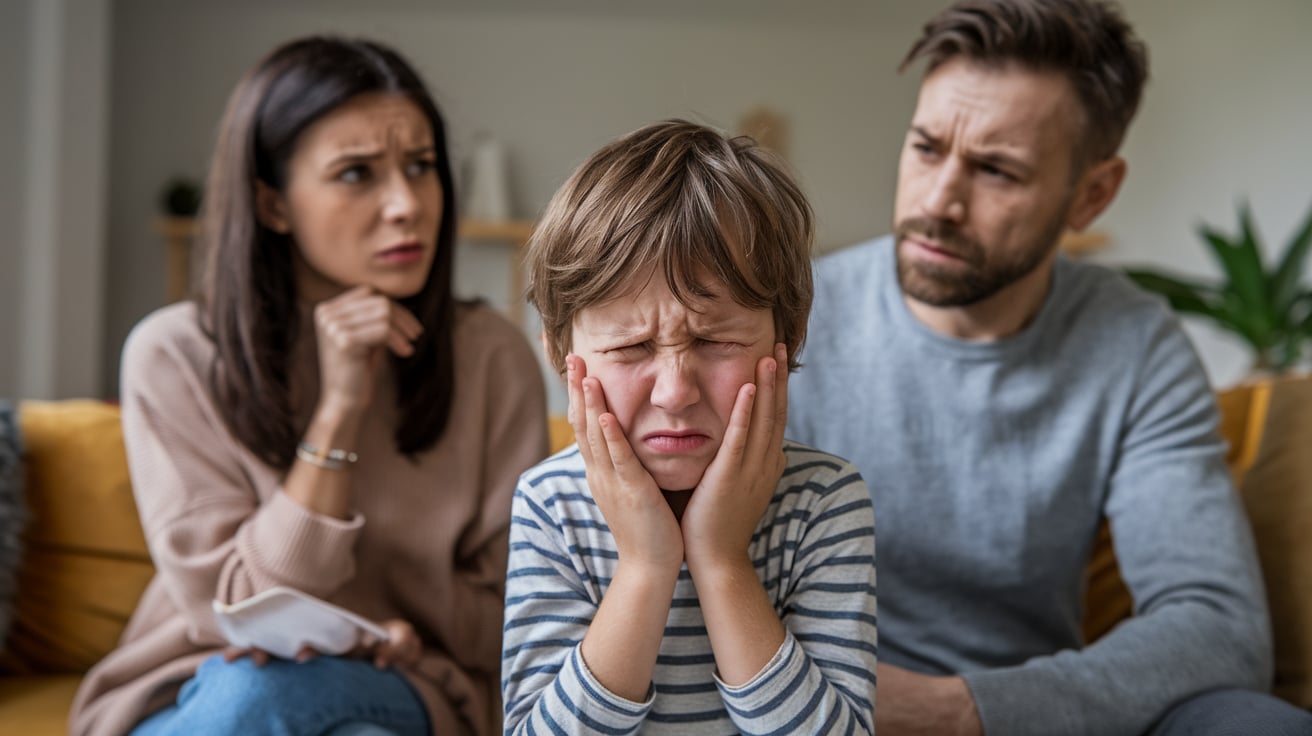Lying and Dishonesty in Childhood: What Parents Need to Know
As parents, we dream of our kids being honest and trustworthy. But, the truth is, kids often lie. They might tell small white lies or bigger fibs. Understanding this can be tough, but it’s key to their growth.
Exploring why kids lie and how it affects them is crucial. We’ll look into the different kinds of lies and their reasons. We’ll also see how lying impacts their feelings and relationships.
Dealing with childhood lies can be tough for parents. But, knowing more about it helps us handle it better. This way, we can create a family where honesty is valued.
Key Takeaways
- Lying and dishonesty are common in childhood development, and understanding the different types of lies children tell is important.
- The reasons behind children’s deceptive behaviour can vary, from a desire for self-protection to a need for attention or control.
- The impact of lying on child development can be significant, affecting their emotional and social well-being.
- Responding to childhood lies effectively and teaching honesty are key strategies for parents to address this challenge.
- Fostering an environment of trust and building a positive parent-child relationship are essential for encouraging truthfulness in children.
Understanding Childhood Lies and Deception
As parents, we often wonder why our kids lie. They might tell small “white lies” or big stories. It’s important to know why they do this to handle it well.
Types of Lies in Young Children
Children’s lies can be simple or complex. White lies are common, like saying they love a gift. They learn these from us. More complex fables show their growing storytelling skills. Sometimes, they lie to hide their actions or avoid trouble.
Developmental Stages and Lying Behaviour
Children’s tendency to lie changes as they grow. Toddlers might lie to test limits or get attention. As they get smarter, their lies become more detailed and planned.
Understanding these changes helps parents deal with childhood lies and deception. It sets the stage for honest talks with our kids.
TO WATCH CLICK HERE
Why Do Children Lie?
Children lying is a complex issue with many reasons. As parents, knowing why kids lie helps us deal with it better.
One big reason kids lie is for attention. They might tell fibs to get their parents or friends to notice them. They also lie to avoid getting in trouble. Some kids lie to protect themselves or others from getting in trouble.
- Seeking Attention: Children may lie to gain the focus of their parents or peers, seeking approval or avoiding punishment.
- Self-Protection: Some children resort to mendacity during young age as a means of shielding themselves or others from the consequences of their actions.
- Developmental Factors: As children’s cognitive and social abilities evolve, their understanding of the nuances of truthfulness and deception also changes, leading to varying levels of falsehoods from little ones.
- Modeling Behavior: Children often mirror the untruthful behaviors they observe in their immediate environment, including from their parents or caregivers.
Knowing why kids lie helps parents find better ways to stop it. This way, we can help our children grow up honest and truthful.
Lying and Dishonesty in Childhood: What Parents Need to Know
| Reason for Lying | Explanation |
|---|---|
| Gaining Attention | Children may lie to receive more attention from parents or peers, either positive or negative. |
| Avoiding Punishment | Lying can be a way for children to escape the consequences of their actions. |
| Protecting Themselves or Others | Children may lie to shield themselves or someone they care about from harm or disapproval. |
| Developmental Factors | As children’s cognitive and social abilities evolve, their understanding of truthfulness and deception changes, leading to varying levels of falsehoods. |
| Modeling Behavior | Children often mirror the untruthful behaviors they observe in their immediate environment, including from their parents or caregivers. |
Understanding why kids lie helps parents find better ways to stop it. This way, we can help our children grow up honest and truthful.
Lying and dishonesty in childhood
Identifying the Reasons Behind Childhood Fibs
As parents, it’s key to understand why your child lies. Childhood dishonesty is often a normal part of growing up. By looking into the common reasons, you can better respond to your child.
Children might lie because they fear getting in trouble. They worry about being punished or disappointing you. They might also lie to get attention or to feel better about themselves.
Another reason is that kids don’t always know what’s real and what’s not. In their early years, they might mix up reality and fantasy. This can lead to unintentional lies as they try to understand the world.
By knowing these reasons, parents can talk to their kids in a way that builds trust. This helps kids learn to be honest and develop integrity as they grow.
The Impact of Lying on Child Development
Childhood is a key time for growth, and lying can affect this greatly. As parents, it’s vital to understand how dishonesty impacts our kids. This knowledge helps us guide them towards a happy and successful life.
Emotional Consequences
Lying can hurt a child’s self-esteem and emotional health. Frequent falsehoods can make them feel guilty, ashamed, and less worthy. This can stop them from making real friends and feeling confident in social situations.
Social Consequences
Lying can also harm a child’s social life. Habitual fabrications can ruin their friendships, relationships with teachers, and family ties. It makes it hard to build trust, leading to isolation and missed chances for social growth.
| Emotional Consequences | Social Consequences |
|---|---|
| Decreased self-esteem Feelings of guilt and shame Diminished confidence | Damaged relationships with peers, teachers, and family Difficulty forming genuine connections Limited opportunities for positive social interactions |
By tackling the reasons behind lying and encouraging honesty, parents can help their kids overcome emotional and social hurdles. This sets them up for a brighter, more rewarding future.
Responding to Childhood Lies Effectively
As parents, we’ve all faced the surprise of our child’s fib or white lie. It’s tempting to react harshly, but a balanced approach is key. Understanding why kids lie and how to respond helps them learn honesty and trust.
Strategies for Parents to Address Lying
When your child lies, stay calm and avoid lectures or shame. Here are some effective ways to handle it:
- Create an environment of trust by encouraging open communication. Let your child know they can talk to you without fear.
- Set clear expectations about honesty and stick to these values.
- Use positive reinforcement to celebrate honesty, not just when they lie.
- Explore the reasons behind the lie and show your child how their actions affect others.
- Role-play scenarios to practice making honest choices.
- Lead by example by being truthful yourself.
Dealing with childhood lies is a long-term effort, not a quick fix. With patience, understanding, and a focus on trust, you can help your child develop honesty and a strong future.
“The greatest gift we can give our children is the ability to tell the truth.” – Unknown
Teaching Honesty and Truthfulness
As parents, teaching honesty and truthfulness to our kids is key. Untruthfulness in children can harm their growth and happiness. By teaching these values, we help them grow up with integrity and a strong future.
One good way is to show honesty ourselves. Kids learn from what we do. When we act truthfully, we teach them honesty is important. We should also talk to them about why honesty is good.
Adding honesty-building activities to their day can help a lot. Here are a few suggestions:
- Encourage your child to share openly, without fear. This builds trust and openness.
- Play out scenarios where lying and truth are shown. This helps them see the choices’ effects.
- When your child is honest, celebrate it. Positive feedback helps them keep being honest.
Teaching honesty is a long-term effort. With patience and commitment, your child will grow into a truthful and confident person.
Fostering an Environment of Trust
Building a strong, trusting bond between parents and kids is key to tackling lying and dishonesty in children. When kids feel safe and supported, they’re more likely to share their struggles with their parents. This trust helps create a space where honesty is encouraged and fibs are less common.
Building a Positive Parent-Child Relationship
To build trust, parents should try these strategies:
- Practise active listening: Listen carefully to your child’s thoughts and feelings without interrupting.
- Communicate openly and honestly: Show honesty and encourage your child to share their experiences, good or bad.
- Spend quality time together: Do activities and talk that bring you closer to your child.
- Provide unconditional support: Let your child know you love and accept them, no matter what.
- Maintain consistency and follow through: Keep your promises to build trust and reliability.
By focusing on these practices, parents can help build a strong, trusting relationship. This makes it less likely for kids to lie and fosters a deep understanding between them.
When to Seek Professional Help
It’s normal for kids to lie sometimes. But if your child’s lying is constant or shows deeper problems, you should get help. This could mean they’re facing emotional or behavioural issues.
Little lies can hide bigger problems like anxiety or depression. Kids might lie to get attention or avoid trouble. Talking to a child psychologist or family therapist can help.
Experts in child development and mental health can explain why your child lies. They can also teach you how to encourage honesty. They might suggest counselling or other help to tackle deeper issues.
Looking for professional help doesn’t mean you’ve failed. It shows you care about your child’s emotional health. With the right support, you can help your child learn to be honest and grow into a well-rounded person.
Conclusion
Understanding and tackling lying and dishonesty in childhood is key for parents. This article has given you insights into childhood deception and why kids might lie. It’s all about helping you know how to handle it.
It doesn’t matter if it’s small fibs or bigger lies, being kind and teaching honesty is vital. Create a space where your child feels safe to talk and learn. This way, they can grow up to be truthful and honest.
Keep in mind, kids telling lies is a normal part of growing up. With the right approach, you can use these moments to grow closer and teach them about honesty. Be careful but also kind as you guide your child through these challenges.
FAQ
What are the common types of lies that children tell?
Kids tell different kinds of lies. Some are small “white lies” to avoid trouble. Others are bigger lies to get attention or protect someone. They also lie to learn about deception.
How does lying behaviour change as children grow and develop?
As kids get older, their lies change too. Young ones tell simple, quick lies. Older kids make up more complex lies. Knowing this helps parents deal with it better.
Why do children choose to lie?
Kids lie for many reasons. They might want attention, avoid punishment, or protect someone. They also lie to learn about deception.
How can parents identify the specific reasons behind their child’s lying?
Parents can figure out why their child lies by watching what happens before they lie. They might lie to avoid trouble or to get attention. Knowing why helps parents find the right way to help.
What are the potential emotional and social consequences of lying and dishonesty in childhood?
Lying can hurt a child’s self-esteem and relationships. It’s key for parents to tackle this to help their child grow up honest and emotionally strong.
What strategies can parents use to effectively address their child’s lying behaviour?
Parents can build trust, set clear rules, and praise honesty. They should also be honest themselves. Knowing why the child lies helps tailor the approach.
How can parents teach their children the value of honesty and truthfulness?
Parents can show honesty by example and through activities. They should teach the consequences of lying. This helps kids grow up with integrity and good decision-making skills.
How can parents build a positive, trusting relationship with their child to address lying and dishonesty?
A strong parent-child bond is key. Parents should listen, talk openly, and show love and acceptance. This helps kids feel safe to be honest.
When should parents seek professional help for their child’s lying behaviour?
If a child’s lying doesn’t stop or shows deeper issues, get help. A child psychologist or family therapist can offer support and strategies.
TO SEE MORE TOPICS CLICK HERE



